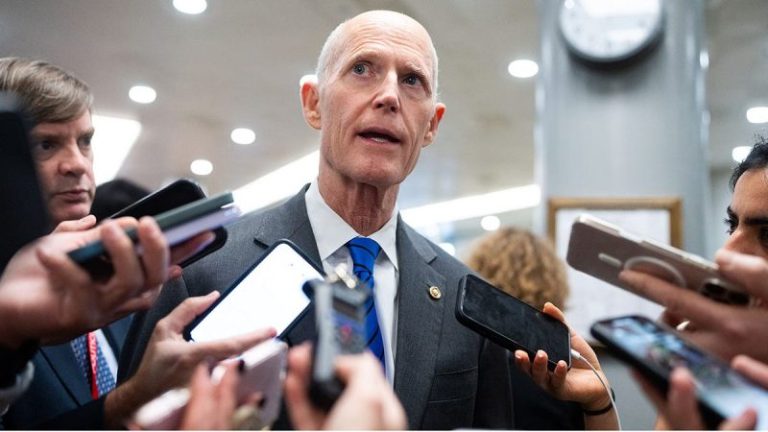The ongoing partial government shutdown is now in its fourth day, but House GOP leaders are confident that the end is near.
House Speaker Mike Johnson, R-La., is aiming to hold a chamber-wide procedural vote on the Senate’s funding compromise on Tuesday afternoon, teeing up a subsequent vote on final passage potentially later in the day.
It comes after he and President Donald Trump quelled a burgeoning rebellion by House conservatives who were threatening to tank the measure if an unrelated election integrity bill was not attached to the funding legislation.
House GOP leaders had been watching anxiously for signs of defections on a House-wide ‘rule vote’ that appears to have been largely abated after the rebellion’s ringleader, Rep. Anna Paulina Luna, R-Fla., told reporters she was backing off her threats on Monday night.
A rule vote allows for lawmakers to open up debate on a given bill, and normally falls on partisan lines even if the underlying legislation has bipartisan support.
Under current House margins, Johnson can only lose support from one GOP lawmaker to still advance legislation on a party-line vote.
Meanwhile, Luna had corralled a group of conservatives to vote against advancing the rule if a bill called the SAVE America Act was not attached to the final funding bill.
The SAVE America Act would require voter ID for casting ballots in federal elections and mandate proof of citizenship in the voter registration process, among other election safeguards.
Luna and Rep. Tim Burchett, R-Fla., had both signaled to Fox News Digital that they would vote against the rule if it was not attached.
But such a move, if successful, would force the bill to be returned to the Senate, where Minority Leader Chuck Schumer, D-N.Y., warned it would be dead on arrival.
Luna told reporters on Monday night that she and Burchett both changed their minds, however, after getting assurances from the White House that Senate Majority Leader John Thune, R-S.D., would force a vote on the SAVE America Act.
‘As of right now, with the current agreement that we have, as well as discussions, we will both be a yes on the rule,’ Luna said. ‘There is something called a standing filibuster that would effectively allow Senator Thune to put voter ID on the floor of the Senate. We are hearing that that is going well and he is considering that…so we are very happy about that.’
The Senate compromise would fully fund the departments of War, Health and Human Services (HHS), Transportation, Housing and Urban Development (HUD), Education and Labor through the end of the fiscal year on Sept. 30, lining up with previously passed spending bills.
But Department of Homeland Security (DHS) funding would only see current levels extended for two weeks in order to give Democrats and Republicans time to negotiate a bill that would more significantly rein in Trump’s immigration crackdown.
It passed the Senate on Friday after Democrats there walked away from an earlier bipartisan deal that would have also fully funded DHS. Left-wing lawmakers demanded further guardrails on Trump’s immigration enforcement after the second of two U.S. citizens were shot and killed by federal agents in Minneapolis during anti-Immigrations and Customs Enforcement (ICE) protests there.
And despite House Minority Leader Hakeem Jeffries, D-N.Y., indicating to Johnson that Democrats would not help him pass the new deal, there are some signs that it will get bipartisan support.
Rep. Rosa DeLauro, D-Conn., the top Democrat on the House Appropriations Committee, said she would vote for the legislation after voting against the original House-passed deal.
‘I will take those ten days and see what we can get,’ she said of the stopgap funding for DHS. ‘And at the end of those ten days, if if we can’t decide to go with it, then it’s a no vote, and Department of Homeland Security is shuttered…but not the other five bills because they’re good bills with good things for the people that we care about.’
In the meantime, nearly 14,000 air traffic controllers are expected to work without pay. Members of the military could also miss paychecks if the shutdown goes on long enough, and the Centers for Disease Control and Prevention (CDC) will be limited in its ability to communicate public health updates to Americans.










